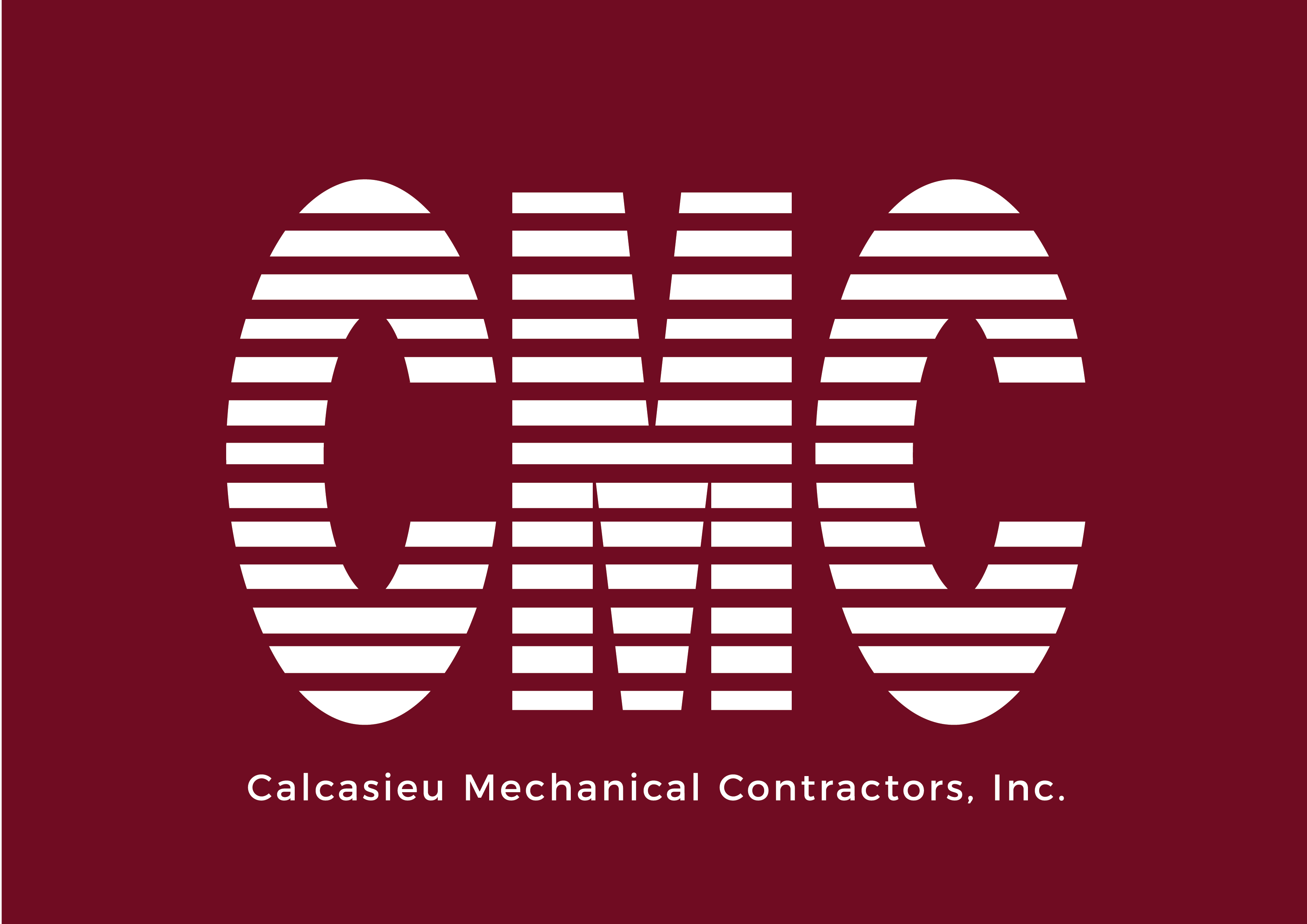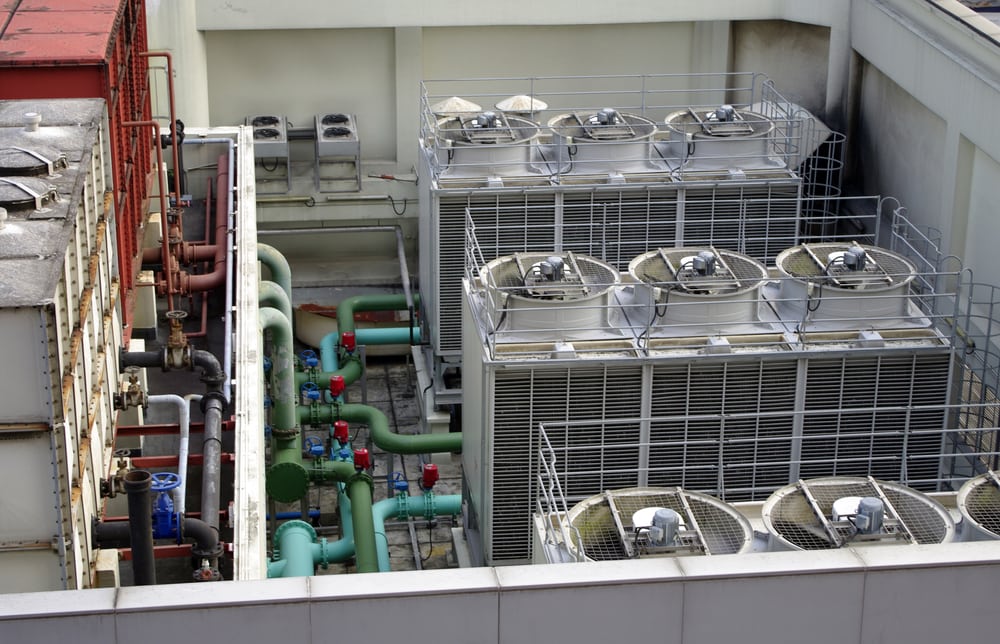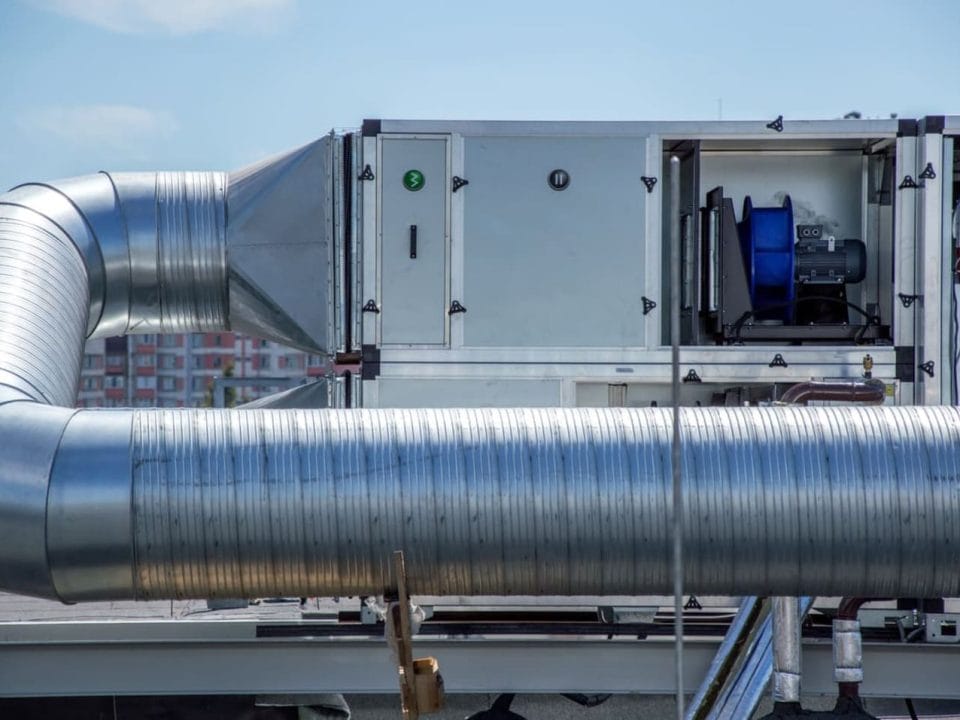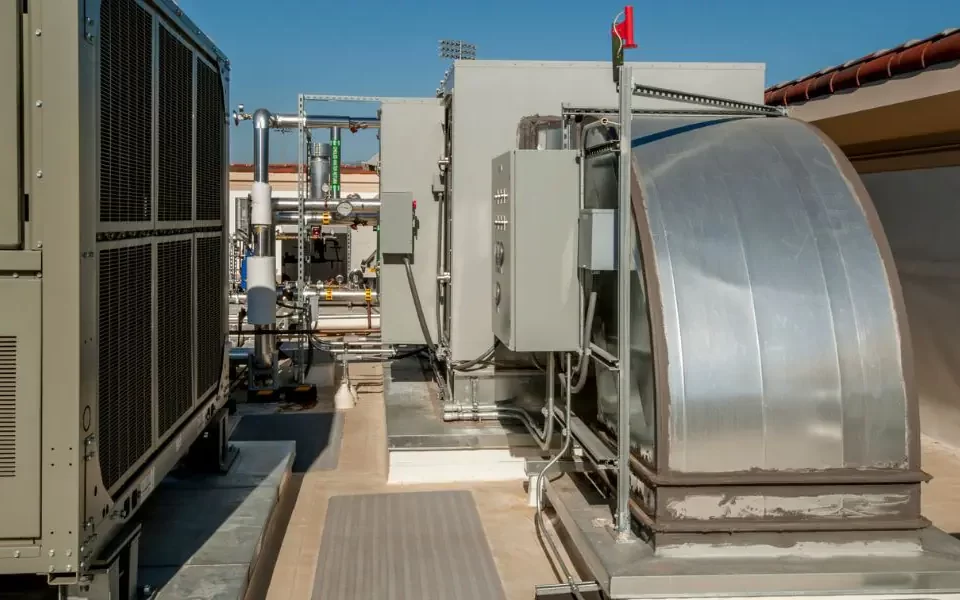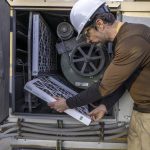
Your Guide to Hiring the Perfect HVAC Contractor
November 11, 2023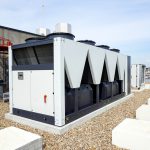
How Does a Chiller Work HVAC? Your Complete Guide
January 9, 2024It’s a sweltering summer day, and you’re sitting in your office sipping iced coffee. Suddenly, the cool breeze from the air conditioner fades away. The room starts heating up as if someone turned off winter and switched on summer. You check your commercial HVAC system, only to find it has called it quits after years of service.
Have we all encountered this at some point?
The real question that pops into mind then is – how long do commercial HVAC systems last? This is crucial information for anyone who owns or manages a property with these systems installed. Knowing this can help you plan ahead for replacement costs while ensuring comfort levels remain consistent within your building.
In this article, we’ll look at the components that can affect an HVAC unit’s longevity and how proper maintenance is essential for prolonging its service life. We’ll explore its key components and discuss how maintenance practices play a vital role in prolonging its service life.
Table Of Contents:
- Understanding the Lifespan of Commercial HVAC Systems
- Impact of Maintenance on Commercial HVAC System Lifespan
- Factors Influencing the Longevity of Commercial HVAC Systems
- Strategies to Extend the Lifespan of Commercial HVAC Systems
- Understanding Premature Failure in Commercial HVAC Systems
- Role of Quality Installation in Extending Commercial HVAC System Lifespan
- Comparative Analysis Between Commercial And Residential HVAC Systems
- Case Studies: Longevity of Different Types of Commercial HVAC Systems
- FAQs in Relation to How Long Do Commercial HVAC Systems Last
Understanding the Lifespan of Commercial HVAC Systems
When investing in a commercial HVAC system, it’s natural to wonder about its expected lifespan; however, the life expectancy of these systems depends on several factors.
The Role of Individual Components in Determining System Lifespan
The average life expectancy for commercial HVAC units hinges largely on their key components. A well-maintained compressor typically serves 8-10 years, while heat exchangers made with modern materials usually last between 15 and 25 years. Interestingly enough, those made from cast iron can outlive them by hitting the 30+ year mark.
If your building uses chillers, they have varying lifespans. Expect water-cooled chillers to serve you faithfully for about 20-30 years and air-cooled ones for around 15-20 years.
Other vital parts like condensers stick around approximately for two decades, while thermostats might need replacement every five to ten years. When considering how different parts contribute to overall lifespan, remember that an average commercial air handler works efficiently between fifteen and twenty years.
Maintenance Schedules and Their Importance
The role of regular maintenance is crucial when talking about the longevity of any machine, including commercial HVAC equipment. Neglecting this duty shortens its service life – roughly estimated at just over a decade.
A little help goes a long way, though; minor upkeep extends its run time up until almost two decades. Consistent attention rewards even more as such units have lived happily for over two decades.
To ensure your commercial HVAC unit’s average life expectancy is on the higher end of these ranges, remember to keep it well-maintained. Your future self will thank you for making such wise decisions today.
Key Lesson:
Other parts, like fans and filters, might need to be replaced more frequently. Their lifespan can range from a few months to several years based on usage and maintenance. It’s important to remember that regular upkeep helps extend the life of your HVAC system.
Impact of Maintenance on Commercial HVAC System Lifespan
The longevity of your commercial HVAC system can significantly increase with regular maintenance. Not all businesses understand the importance of proper maintenance for their commercial HVAC systems. Let’s look at some numbers.
A commercial HVAC unit that receives no care might last 15 to 18 years. That’s a decent lifespan, but it could be much more with a little effort. Even minimal upkeep pushes the limit to about 18-20 years. You’re looking at around 20-25 years with some consistent TLC.
What if we said there was even more potential? You heard right; high-maintenance units have been known to exceed an impressive life expectancy of over 25+ years.
Maintenance Schedules and Their Importance
So, why is maintaining your commercial HVAC equipment so crucial? Well, these machines are just like us humans – they need regular check-ups to keep them running smoothly.
Routine inspections help identify minor issues before they escalate into costly repairs or premature failure. The trick here is sticking to a schedule and not waiting until something goes wrong.
Your preventive measures should include tasks such as cleaning air filters regularly and inspecting heat exchangers for wear and tear damage – small steps that make a big difference in performance and durability over time.
The Bottom Line: High Maintenance Pays Off
All this talk about ‘high maintenance’ may sound demanding, but trust us when we say it pays off. Your business saves money in the long run by avoiding frequent replacements or significant repairs due to neglectful handling.
In short, give your heating & cooling equipment some love. It will thank you with reliable service for years to come. And remember, you don’t have to do it alone. Our experienced HVAC professionals are here to assist you with a lasting and efficient system.
Key Lesson:
Regular care and maintenance can significantly extend your commercial HVAC system’s lifespan, with high-maintenance units known to last over 25 years. Routine check-ups help spot minor issues before they become major problems. So remember, small steps like cleaning air filters and inspecting heat exchangers make a big difference in performance and durability.
Factors Influencing the Longevity of Commercial HVAC Systems
The lifespan of commercial HVAC systems is a hot topic for building owners and facility managers. But what are the key factors that determine this lifespan? It’s not just about picking out the right equipment or setting up a maintenance schedule, although these certainly play crucial roles.
Type, installation quality, and wear-and-tear are among some critical influences on an HVAC system’s service life. The American Society of Heating, Refrigerating, and Air-Conditioning Engineers (ASHRAE) estimates average life expectancies to range between 15 to 25 years for most components but stresses that these numbers can vary significantly based on several influencing factors.
Role of Equipment Type
Different heating and cooling equipment types have varying lifespans due to their construction materials and operational stress levels. For instance, water-to-air heat pumps might last only a fraction as long compared to cast iron boilers which often exceed their estimated lifetime with proper maintenance.
Influence Of Installation Quality
A well-installed commercial or industrial HVAC unit has fewer issues down the line leading to longer system longevity. A poorly installed unit may cause unnecessary strain on your building’s heating & cooling units resulting in premature failure – another reason why professional help should be sought during installation.
Mitigating Wear And Tear Damage
No matter how top-notch your air conditioner or chiller is at first glance – without regular maintenance, its performance will start declining sooner rather than later. Regular upkeep helps identify small problems before they escalate into costly repairs extending overall HVAC life expectancy.
For example, changing air filters regularly improves energy efficiency by ensuring your system isn’t working harder than it needs to.
Understanding the key factors that influence HVAC lifespan can help you make more informed decisions about your commercial facilities’ heating and cooling systems. With a little bit of forethought and regular upkeep, these vital building services can keep working effectively for you for quite some time.
Key Lesson:
Commercial HVAC systems’ longevity is impacted by equipment type, installation quality, and regular maintenance to mitigate wear and tear. While the ASHRAE estimates an average lifespan of 15-25 years for most components, remember that proper care can extend this significantly. So, make smart choices about your system and maintain it well to keep your building comfortable for many years.
Strategies to Extend the Lifespan of Commercial HVAC Systems
The lifespan of your commercial HVAC system can be significantly influenced by how you maintain and manage it. Let’s explore some strategies that could help extend its life expectancy.
Addressing Wear and Tear Damage
All mechanical systems, including your commercial HVAC units, experience wear and tear over time. Regular inspections are key to spotting potential issues early on before they become costly repairs or cause premature failure.
Pay close attention to the apparent components, like air filters, and less visible pieces, like condensers, heat exchangers, and thermostats. Remember that each part plays a role in overall performance.
Maintenance Schedules Matter
Regular maintenance is critical for prolonging an HVAC unit’s life expectancy. A well-maintained unit can last between 20 and 25 years, while a lack of upkeep may reduce this average down to 15 to 18 years. Following a strict maintenance schedule allows small issues to be addressed promptly, preventing them from escalating into larger problems later on.
Sizing & Load Calculations Are Key
Proper sizing is crucial to ensure longevity when installing an HVAC system. Units too large for their space tend to cycle more frequently, causing undue strain, which reduces energy efficiency and ultimately leads to premature breakdowns. Getting professional advice about load calculations during installation can go a long way in preserving your system’s health in the long term.
Keep these tips handy next time you’re looking at ways to get more out of your investment.
Understanding Premature Failure in Commercial HVAC Systems
Premature failure of commercial HVAC equipment can be a business owner’s worst nightmare. What if I were to say there are signals that can be detected and techniques employed to avoid this problem?
Spotting the Signs of Aging and Wear
The first step towards managing premature failure is knowing what to watch for. An increase in energy bills, inconsistent temperatures, or odd noises could all point toward aging and wear in your commercial HVAC units.
Beyond these noticeable issues, hidden problems like internal corrosion or refrigerant leaks might also contribute to early system breakdowns. It’s always best to call an expert when something seems off with your unit.
Mitigating Premature Failure: A Preventative Approach
Preventive measures can go a long way toward prolonging the lifespan of your HVAC systems. Regular maintenance checks identify potential issues and allow necessary fixes before small problems become costly repairs.
You may wonder how often you should schedule these check-ups. While it depends on various factors, including your system’s age and usage level, most experts recommend at least twice-yearly inspections. Reach out today to our St. Louis heating & air conditioning professionals, who will guide you through crafting an optimal preventive maintenance plan based on your specific needs.
The Cost Factor
Maintaining regular check-ups comes with costs; however, neglecting them usually results in even more expensive emergency repairs or replacements due to premature failures. Hence, considering maintenance as an investment rather than an expense helps businesses save money over time by avoiding unnecessary downtime that disrupts operations and impacts profits negatively.
Role of Quality Installation in Extending Commercial HVAC System Lifespan
The quality of installation plays a pivotal role in the longevity of commercial HVAC systems. Let’s break down why.
Firstly, proper ductwork design and professional installation ensure optimal performance from your commercial HVAC units. Missteps during this stage can lead to inefficient operation, accelerating wear and tear on the system components, significantly reducing their lifespan.
A well-executed installation also means that your unit is correctly sized for its intended environment. An oversized or undersized system not only performs poorly but will need more frequent repairs and have a shorter service life.
Professionalism Matters
The professionals you hire for an installation should be certified technicians with extensive experience in handling large-scale installations such as multi-zone rooftop air conditioners or complex cooling towers. Their knowledge goes beyond simple setup – they understand how different elements work together within an integrated system to achieve peak efficiency while extending equipment life expectancy.
Better Now Than Later
Mistakes made during initial setup are often difficult (and costly) to correct later on. For instance, incorrect load calculations at the outset could force your unit to overwork itself, leading to premature failure.
Comparative Analysis Between Commercial And Residential HVAC Systems
Have you ever wondered how long commercial HVAC systems typically last in comparison to residential ones? Both have their own set of key factors that determine lifespan and need for maintenance.
Energy Efficiency Considerations
Commercial units often take the lead when it comes to energy efficiency. But why is this important? Energy-efficient models are designed to run smoother and longer with less wear and tear damage. This helps extend a unit’s average life expectancy, whether a commercial HVAC system or a residential one.
Commercial and residential HVAC systems possess distinct characteristics that separate them. Size matters when we talk about these two types of equipment – bigger isn’t always better. For instance, an oversized air conditioner in your home could result in frequent on-and-off cycling leading to premature failure.
This doesn’t mean that all hope is lost for homeowners; regular maintenance like changing out air filters regularly can significantly increase your unit’s service life.
In contrast, larger multi-zone rooftop air conditioners found at commercial facilities typically demand more complex preventive maintenance schedules due to their complexity. Still, if maintained well, they tend to have longer lifespans than smaller units installed incorrectly at homes without proper consideration for load calculations.
No matter what type of building’s heating or cooling equipment you use – be it radiant heaters or water-to-air heat pumps – correct size coupled with quality installation has been proven essential towards extending its lifespan, thus saving costs in long-term repairs and replacements, which eventually contributes towards achieving higher levels of energy efficiency too.
Case Studies: Longevity of Different Types of Commercial HVAC Systems
As the proverb goes, preventive maintenance is essential for ensuring the long-term operation of commercial HVAC systems. Let’s delve into some case studies showcasing how longevity varies across different types to give you a clearer picture.
Chiller Lifespan Case Study
In one instance, we observed an air-cooled chiller at a mid-sized office building in St. Louis. Despite being subject to the city’s hot summers and cold winters for 20 years, with proper maintenance schedules followed religiously by our HVAC experts, its performance remained top-notch. Water-cooled chillers could have stretched this lifespan even more – up to 30 years.
Rooftop Air Conditioner Life Expectancy
Moving onto rooftop air conditioners installed in various commercial facilities around town, their life expectancies were also impressive when given adequate care and attention. Some multi-zone rooftop units worked efficiently for over two decades before showing signs of wear or tear damage and needing significant repairs.
The Impact Of Size And Quality Installation On HVAC Performance
Last but not least was an oil furnace installed correctly within a small fraction-size property where quality installation made all the difference. Not only did it deliver optimal heat during harsh winters for over 15 years, but thanks to energy-saving strategies employed right from day one – including choosing the correct size and maintaining clean filters – premature failure was kept at bay.
All these cases prove why regular preventive maintenance on your commercial heating and cooling equipment can drastically increase their service life while simultaneously enhancing energy efficiency.
FAQs in Relation to How Long Do Commercial HVAC Systems Last
How often should commercial HVAC units be replaced?
Typically, you’d swap out a commercial HVAC unit every 15-25 years. But it depends on usage and maintenance.
How long is a commercial HVAC warranty?
A standard warranty for commercial HVAC systems lasts between 5 to 10 years, depending on the manufacturer’s terms.
What is the depreciable life of a commercial HVAC unit?
The IRS usually pegs the depreciable life of a commercial HVAC system at about 39 years.
Can HVAC systems last 30 years?
Sure, some high-quality, well-maintained components like chillers can make it past the big three-zero.
Commercial HVAC Systems, a crucial part of any commercial air conditioning support, typically have a lifespan ranging between 15 to 25 years. However, proper maintenance and usage can significantly affect this timeline. At Calcasieu Mechanical Contractors, Inc., we strive to enhance the performance and longevity of your HVAC systems, ensuring they operate at peak efficiency for as long as possible. Your investment in a robust HVAC system today can yield comfort and reliability for years.

Hailing from the picturesque town of Lake Charles, Louisiana, Jim Blanchard stands as an exemplar in commercial HVAC installation and services. As President of Calcasieu Mechanical, he has leveraged his deep industry knowledge and innovative strategies to establish the company as a leading regional service provider. Under Jim’s leadership, Calcasieu Mechanical has expanded its portfolio of high-quality services and earned the trust and respect of businesses throughout Louisiana. The company’s commitment to excellence, reflected in its endeavors, stems from Jim’s dedication to ensuring every project meets and exceeds client expectations.
